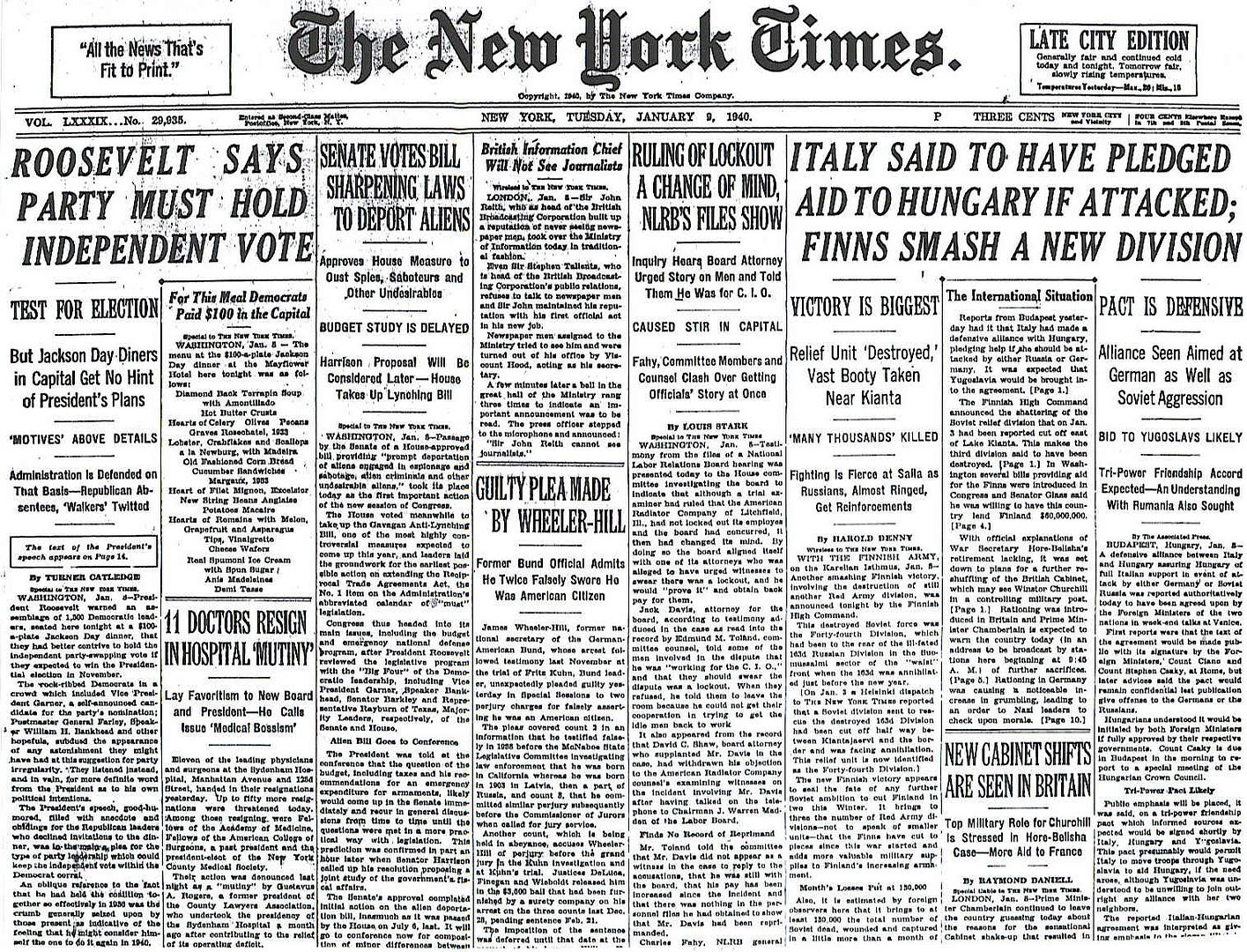
Posted on 01/09/2010 4:45:25 AM PST by Homer_J_Simpson

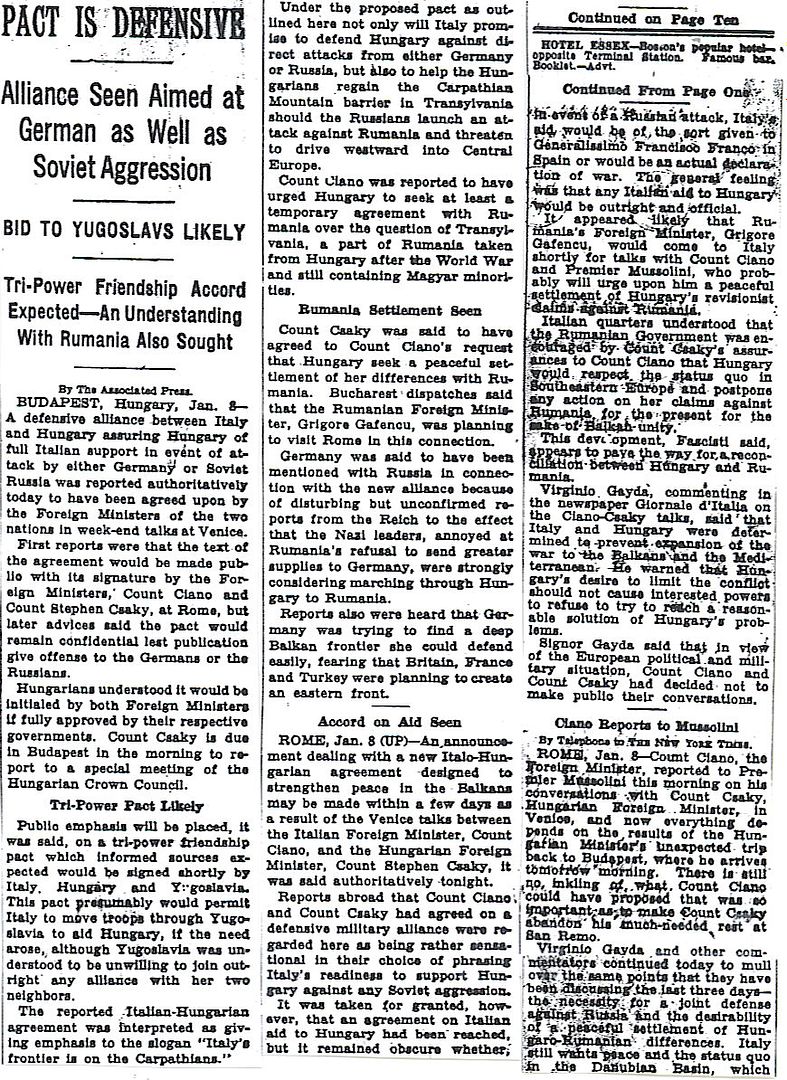
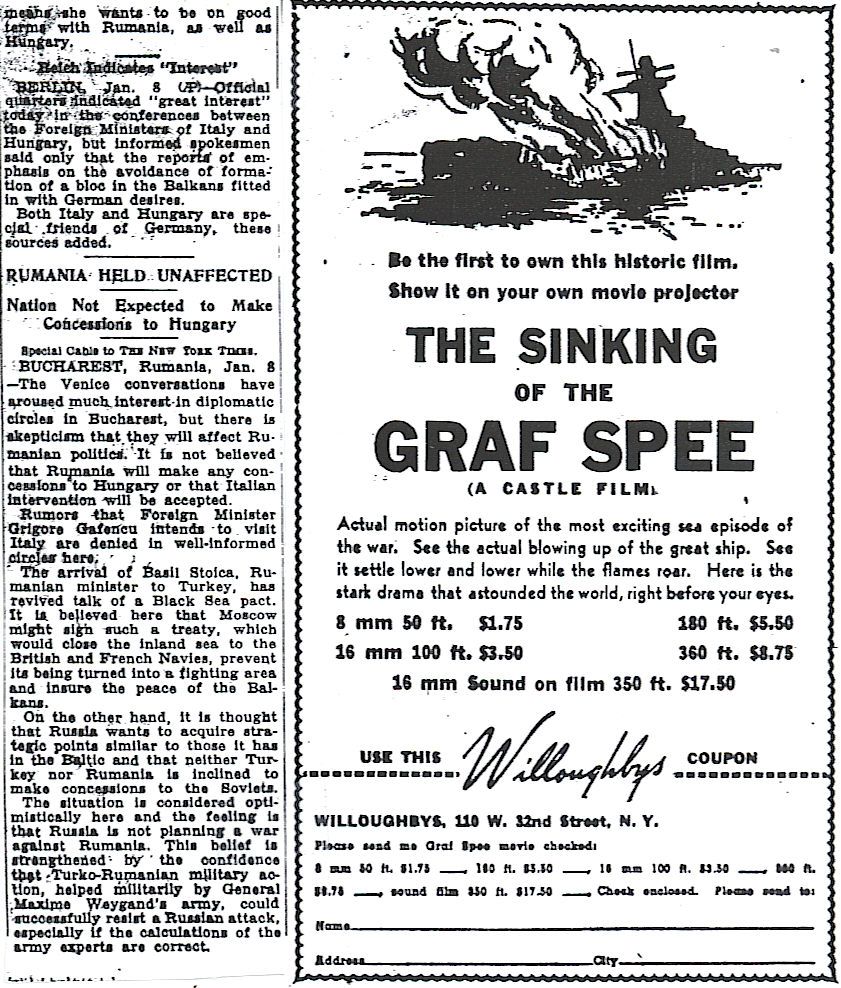
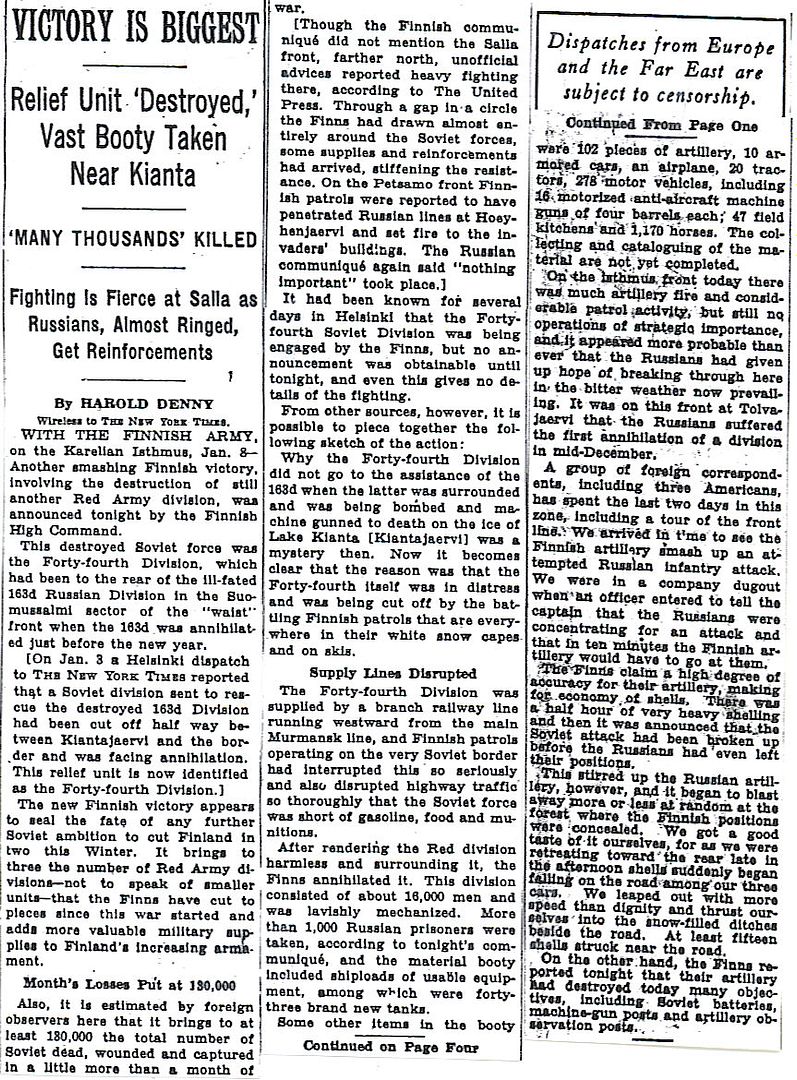
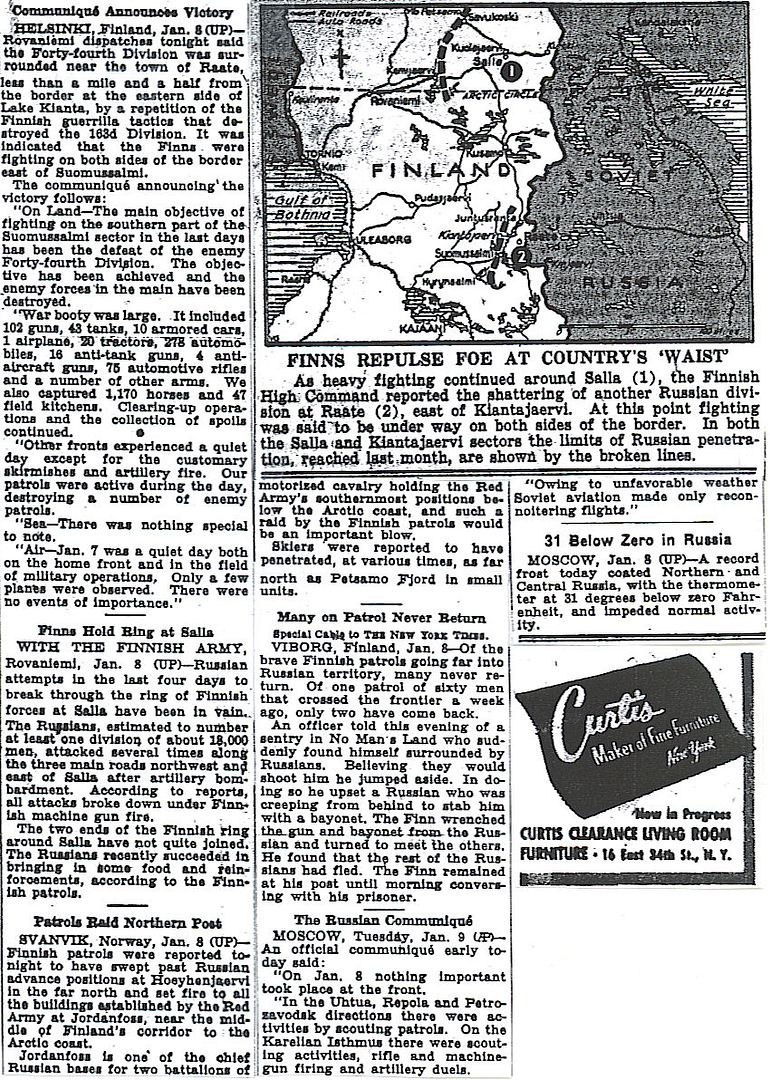
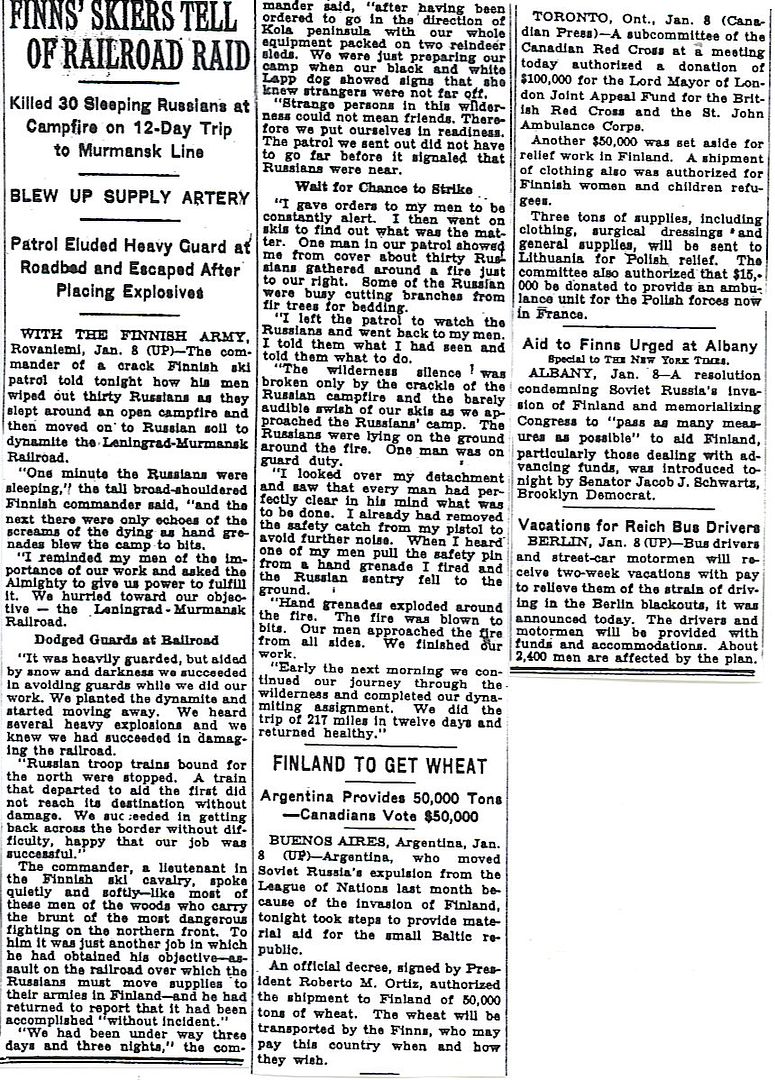
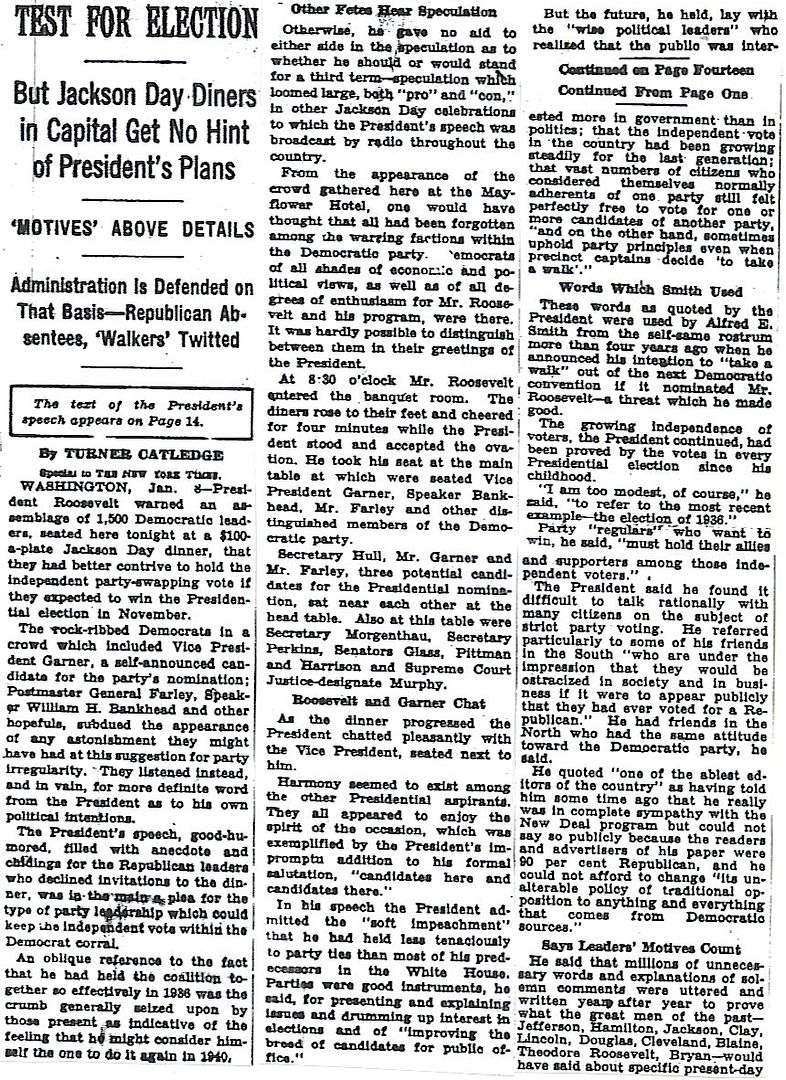
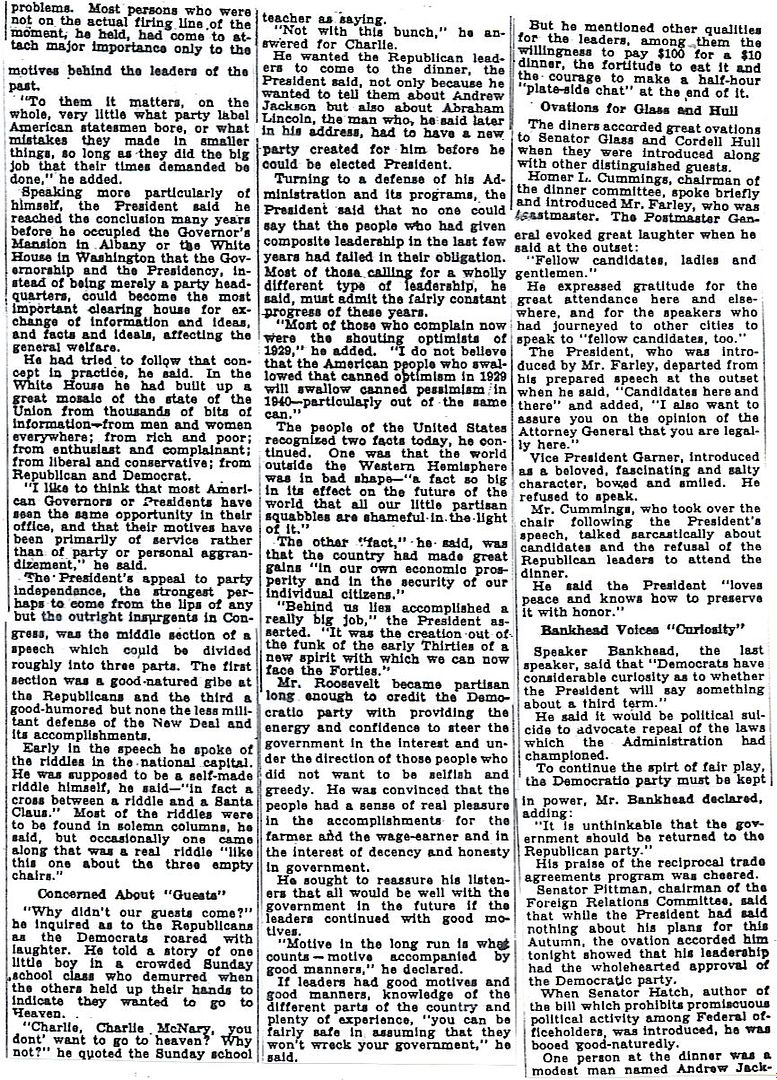
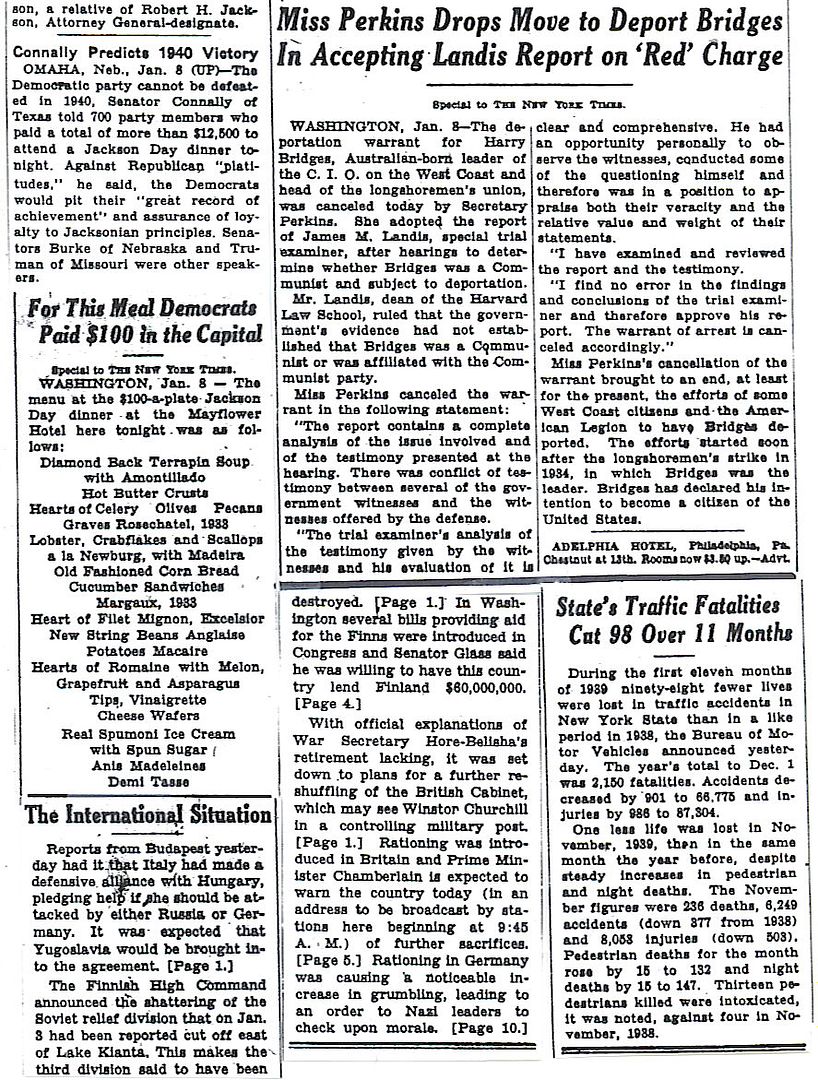
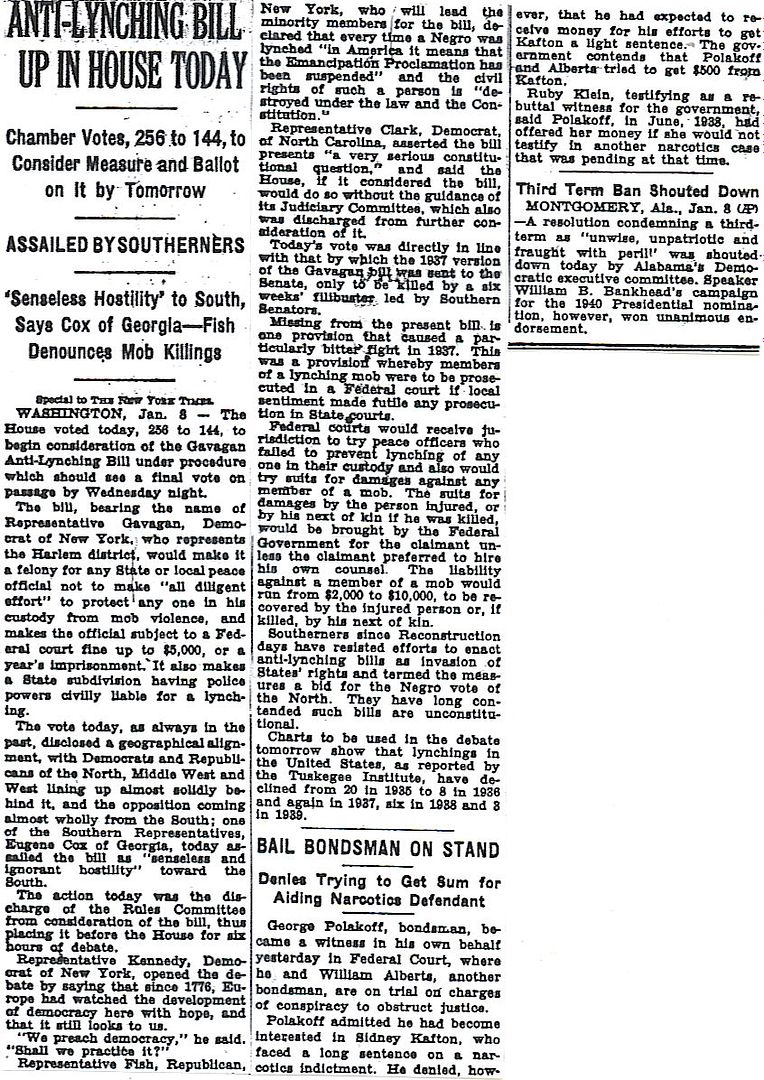
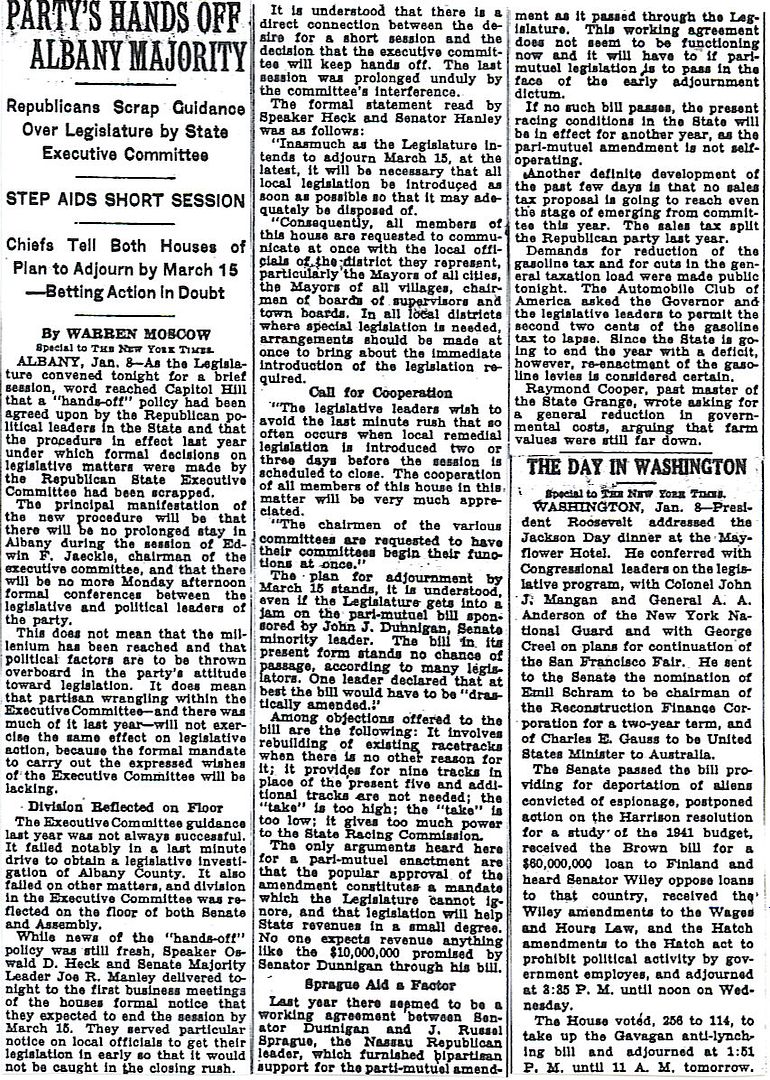
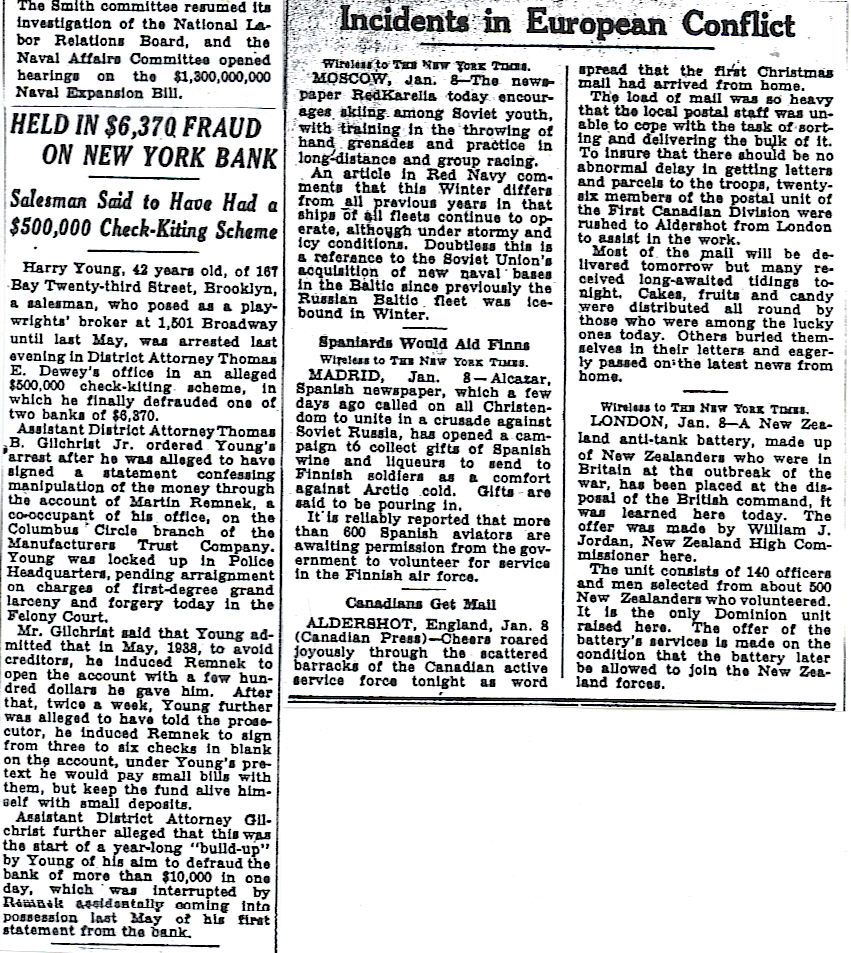
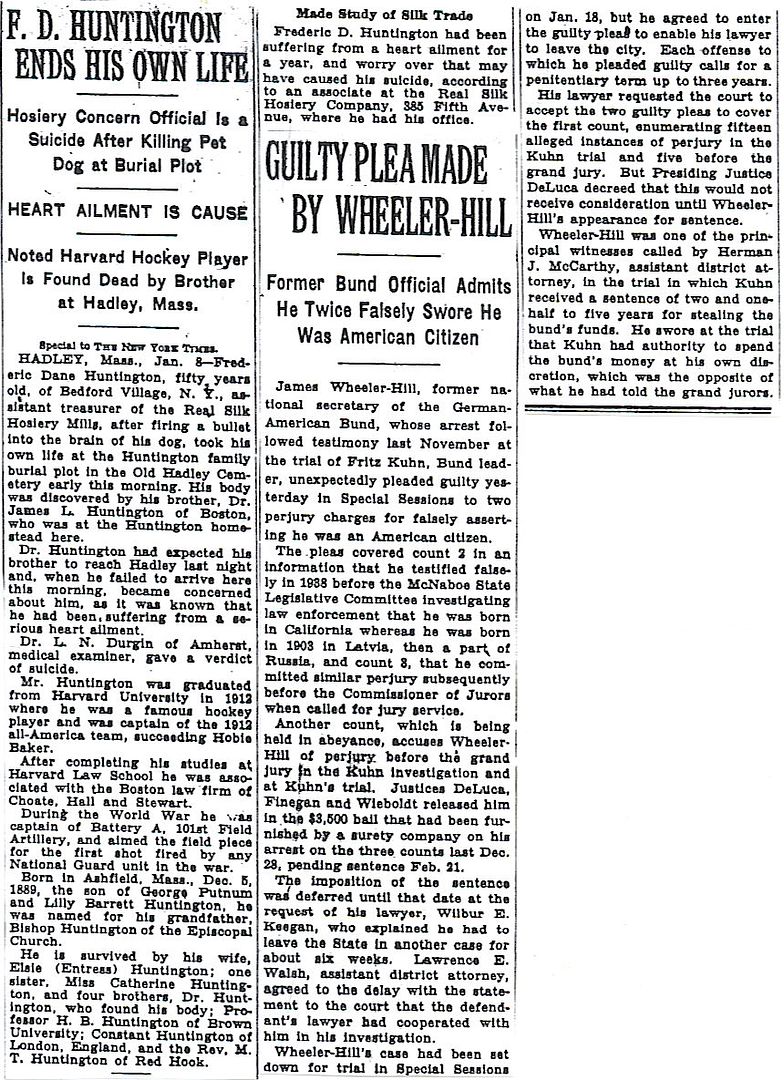
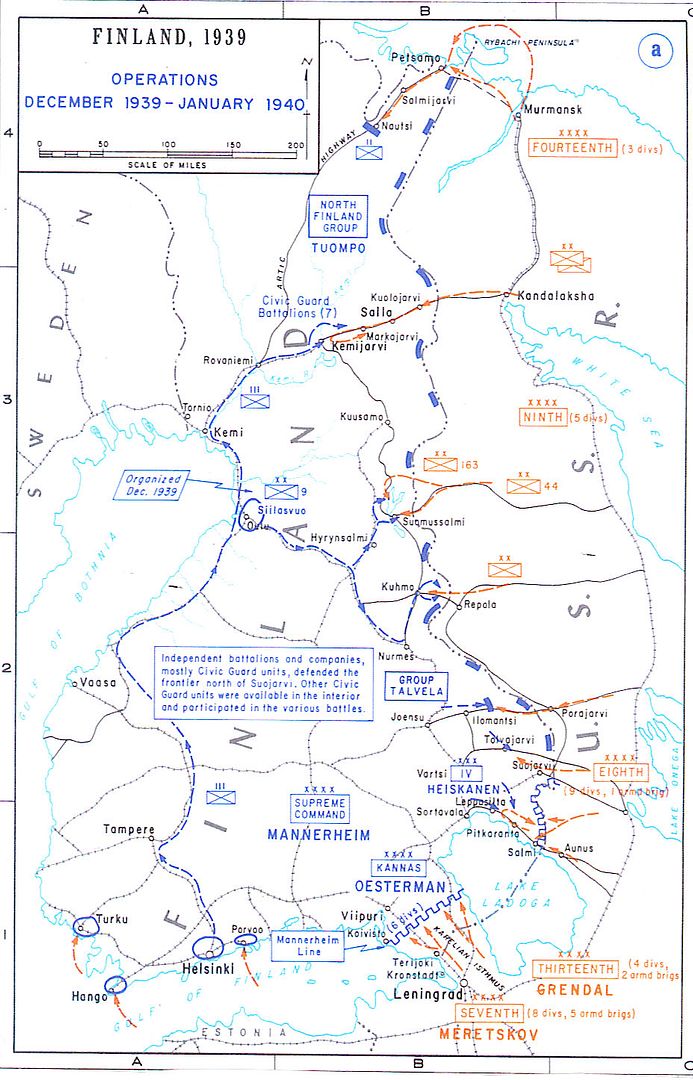
Pact is Defensive – 2-3
Victory is Biggest – 4-5
Finns’ Skiers Tell of Railroad Raid – 6
Test for Election – 7-9
For This Meal Democrats Paid $100 in the Capital – 9
The International Situation – 9
Miss Perkins Drops Move to deport Bridges In Accepting Landis Report on ‘Red’ Charge – 9
State’s Traffic Fatalities Cut 98 Over 11 Months – 9
Anti-Lynching Bill Up in House Today – 10
Party’s Hands Off Albany Majority – 11
The Day in Washington – 11-12
Held in $6,370 Fraud on New York Bank – 12
Incidents in European Conflict – 12
F.D. Huntington Ends His Own Life – 13
Guilty Plea Made by Wheeler-Hill – 13
http://www.onwar.com/chrono/1940/jan40/f09jan40.htm
Third British sub lost in Heligoland
Tuesday, January 9, 1940 www.onwar.com
In the North Sea... A German minesweeper depth charges the Royal Navy submarine Starfish in the Heligoland Bight. The sub is scuttled afterwards. Following this third incident, British submarine operations in the Heligoland Bight are temporarily suspended. Meanwhile, off the southeast coast of England, the British ocean liner Dunbar Castle is minded and sunk.
In Britain... Prime Minister Chamberlain makes the first in a series of “morale-boosting” speeches by Cabinet Ministers. Meanwhile, there is public surprise that, after only 4 months of war, the British employment figure for January stands at 1.6 million (about 120,000 higher than the average for 1939). This increase is despite of the call-up of 1.5 million men for military duty.
In France... The first colonial contingent, of Cypriot troops, arrives to reinforce the British Expeditionary Force.
In Berlin... The West Prussian SS chief reports the successful elimination of 4000 incurable mental patients in Poland.
http://homepage.ntlworld.com/andrew.etherington/month/thismonth/09.htm
January 9th, 1940
UNITED KINGDOM: After four months of war, the British unemployment figure for January stands at 1,603,000. Despite the call-up of over 1,500,000 men, the unemployed have increased by 12,000 over the average for the last year.
The harsh winter weather is partly responsible, by reducing outdoor employment, together with a slump in the building trade. because of government restrictions on civil building and the shortage of timber, 250,000 building workers have been laid off. Germany states that it has only 18,000 unemployed.
RAF Fighter Command: Unescorted merchant ships in the North Sea are attacked by an unknown number of Luftwaffe aircraft. Three British vessels are sunk; two Danish vessels are damaged; many casualties.
RAF Bomber Command: 4 Grp. 77 Sqn. Reconnaissance - Rheine, Emmerich, Hamm and Osnabruck. Two aircraft. Opposition slight.
102 Sqn. ‘Security Patrols’ - Hornum and Borkum. Four aircraft. Flarepath bombed. Opposition light.
Destroyer HMS Fernie launched. (Dave Shirlaw)
NORTH SEA: S class submarine HMS Starfish attempts an attack on German minesweeper M7, but due to faulty drill, no torpedoes are actually fired. After a number of depthcharge attackes by the minesweeper and some other vessels, conditions inside the submarine become serious, and while attempting to surface after dark, Starfish found herself under machine gun fire from enemy vessels on either bow. The commander decides to abandon the submarine and scuttles in the North Sea southwest of Heligoland. This is the third RN submarine to be lost within as many days. Submarine operations in the area are abandoned. (Alex Gordon)(108)
ENGLISH CHANNEL: The British ocean liner SS Dunbar Castle is mined and sunk off the southeast coast of England. It is feared that 152 people have lost their lives. (Jack McKillop)
FRANCE: The first colonial contingent, of Cypriot troops arrives to reinforce the BEF.
GERMANY: The West Prussian SS chief reports the successful “elimination” of 4,000 incurable mental patients in Poland.
ATLANTIC OCEAN: At 0221, SS Manx was hit by one torpedo from U-19 off Kinnaird Head and sank within two minutes. Eight survivors managed to grab hold of an upturned lifeboat, but were scantily clad and in the stormy weather four of them gave up. After 8 hours the remaining four survivors were picked up by the Norwegian steam merchant Leka along with two men rescued from a raft. (Dave Shirlaw)
http://www.maritimequest.com/daily_event_archive/2009/01_jan/09_mv_dunbar_castle.htm
Sailing from England to Beira, Mozambique the Union-Castle Line’s 10,002 ton passenger ship Dunbar Castle
hit a mine 7 miles from Ramsgate on Jan. 9, 1940. She was in convoy OA-69 which was to join up with another
convoy after getting into the Atlantic. All told there were 150 crewmen and 48 passengers including 9 children
and the pilot on board when she left.
Soon after the explosion she began to list making launching the boats difficult, but the crew managed to get all
the passengers except one in to them and away. Most of the crew also made it into the boats, but several had
been killed by the explosion including the master. Others in the galley were scalded and died of their injuries.
One passenger and several crewmen were missing after a head count was made, none were found alive. The
pilot had been injured and a race horse that had been on deck was knocked into the sea. Thirty minuets after
striking the mine the Dunbar Castle settled on the bottom on an even keel. In all ten lives were lost.
As the master was mortally wounded the man in charge of evacuating the ship was Chief Officer Herbert H.
Robinson, for his actions in getting the boats away and maintaining order during the ordeal he was awarded
the OBE in March 1940.
Although reports of the sinking state that the ship broke in two the photograph does not support this. The wreck
was demolished following the war. Dunbar Castle was the first war loss for the Union-Castle Line in World War
2.

http://www.clydesite.co.uk/clydebuilt/viewship.asp?id=550
The harsh winter weather is partly responsible, by reducing outdoor employment, together with a slump in the building trade. because of government restrictions on civil building and the shortage of timber, 250,000 building workers have been laid off. Germany states that it has only 18,000 unemployed.
In an early chapter of "Rise and Fall of the Third Reich," Shirer says that the Nazis handled the unemployment problem in a direct way. They matched all the unemployed with businesses and declared that "you now work for this company." End of problem. Obama might consider this method if our unemployement figures don't improve.

Northern Finland: another crushing Finnish victory is recorded in the north, this time at Suomussalmi. A second enemy division is destroyed as Finnish troops push onwards to the border.
Photo: SA-KUVA
Soviet assault fails in Ladoga Karelia
I love this feature. I can’t wait until 2011 when the fascinating eastern front will be coming into play.
My father escaped from Hungary in 1956 and came to the US.
He tells me repeatedly that they were told of pledged help from Europe and the CIA if they rose up against the communists.
Of course, none of it came and they were crushed.
Pitchforks vs tanks.
bumpster
2010 will be plenty eventful. Hitler has some preliminary work to do in the west before he heads for Moscow.
True. The Western and Northern Blitkriegs were certainly eventful.
I just did a search for that movie ‘The Sinking of the Graf Spee’, hoping it was on YouTube but came up empty. It’s gotta be around somewhere.
By the way, the “Representative Kennedy” from New York who opened the anti-lynching bill debate was Martin John Kennedy, no relation to the famous Kennedy family as far as I can tell.
Harry Bridges should have been shot. He was an NKVD asset.
Case Yellow is, IMHO, one of the five greatest military campaigns in history [probably #2].
I don't know most details of the 1956 uprising in Hungary:
"The U.S. President, Dwight Eisenhower, was aware of a detailed study of Hungarian resistance which recommended against U.S. military intervention, and of earlier policy discussions within the National Security Council which focused upon encouraging discontent in Soviet satellite nations only by economic policies and political rhetoric."In a 1998 interview, Hungarian Ambassador Géza Jeszenszky was critical of Western inaction in 1956, citing the influence of the United Nations at that time and giving the example of UN intervention in Korea from 1950 to 1953.
"During the uprising, the Radio Free Europe (RFE) Hungarian-language programs broadcast news of the political and military situation, as well as appealing to Hungarians to fight the Soviet forces, including tactical advice on resistance methods.
"After the Soviet suppression of the revolution, RFE was criticized for having misled the Hungarian people that NATO or United Nations would intervene if the citizens continued to resist."
What I do know is that President Eisenhower was Roosevelt's choice to command allied forces, and he accepted FDR's basic deal with Stalin: the Soviets got a free hand in Eastern Europe.
Remember, this deal was first made early in the war, at a time when Hitler controlled virtually all of Europe. So Roosevelt, Churchill and Stalin agreed amongst themselves -- when the war was over, the Soviets would get the East, the western allies the rest of Europe.
The poor Hungarians didn't get the word. Reminds me of today's Iranian protestors appealing to President Obama for help, asking: are you with us or with them? I'm told, in Iranian, that's a word play on his name.
Well, "Eisenhower" comes from the German for iron worker. But like President Obama, Eisenhower did very little to confront the empire of Russia's "man of steel."
What the Americans did was worse than inaction. Franco wanted to supply the freedom fighters with anti-tank guns via air drops. He needed to refuel the planes at western air bases, however. The Americans refused to allow the Spanish to land for refueling. So the betrayal was active, not passive.
Disclaimer: Opinions posted on Free Republic are those of the individual posters and do not necessarily represent the opinion of Free Republic or its management. All materials posted herein are protected by copyright law and the exemption for fair use of copyrighted works.